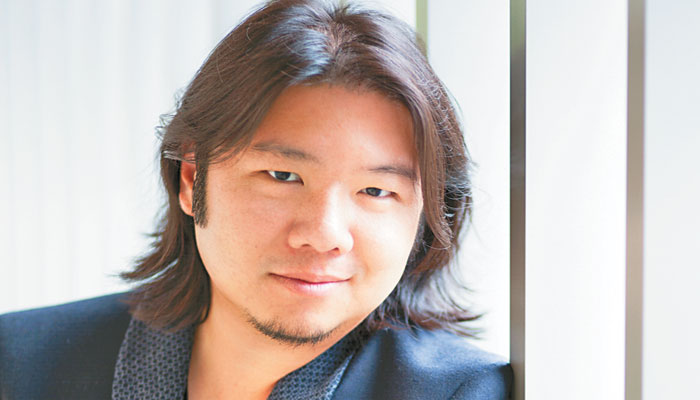The crazy of Kevin Kwan
In an exclusive conversation with Instep, Kevin Kwan spoke about how the film had managed to acquire a cult status.
One can only imagine what helming a commercially viable movie, based purely on an underrepresented race, that too in an industry very intractably set in its ways, must be like. It’s unheard of and yet that’s how Hollywood had a reinvention of sorts last year when Warner Brothers released Crazy Rich Asians, a heartwarming romantic-comedy based on the 2013 novel, penned by Kevin Kwan, the author and later the executive producer on the cinematic adaptation.
Whilst the novel was intended at introducing a contemporary Asia to a North-American audience, the film was able to caste a global impression. The only Asian representation that had earlier existed in Hollywood was majorly influenced by martial arts or stereotypical comedy. Crazy Rich Asians, with its all-Asian star cast, on the other hand became one of the most impactful cinematic offerings in recent times; it opened avenues and increased inclusivity like never before.
In an exclusive conversation with Instep, Kevin Kwan spoke about how the film had managed to acquire a cult status.
“The story in the Crazy Rich Asians trilogy had been brewing in my head for twenty years,” he narrated. “It began purely as a passion project. I wanted to record the memories of my youth; I wanted to see if I could write a novel, and I never in my wildest dreams thought it would get published, let alone make the impression it has,” he continued with enthusiasm. Coming from a family known for its riches and luxury lifestyle, Kwan’s novel was heavily inspired by personal experiences.
One wonders if there were ever any apprehensions on how true the movie would be to Kwan’s novel, which is often a risk in adaptations.
“There were never any apprehensions because I chose the producing team and we were partners every step of the way,” he replied. “I saw every draft of the script, helped to choose our gifted screenwriters, our genius director, Jon M. Chu, and the wonderful cast. So much so that I also worked closely with the costume and set designers to ensure that the look of the film would be authentic to the world of the book.”
Crazy Rich Asians also heavily contributed to better, well-rounded and more commercial Asian representation in Western cinema. How does Kwan view it?
“The film caused an incredible and undeniable seismic shift in Hollywood. At first people were saying things to me like, ‘How does it feel to have changed culture?’ ‘Did you know you started a revolution?’ And I thought people were just saying this to be nice, but I’m seeing the actual effects now that I’m working on a few different film and TV projects of my own,” he exclaimed.
“Asian actors have suddenly all become ‘hot properties’, especially all the actors from Crazy Rich Asians. Henry Golding, Constance Wu, Gemma Chan, Awkwafina — they’ve become superstars overnight,” he added. “They are being cast in big Hollywood movies like never before. And projects with Asian themes and Asian characters are suddenly much in demand. So I’m seeing a real change from the ground up.”
The film also manages to present its characters as wealthy, glitzy and glamorous, living the good life, which is quite the contrary to how the Asian community is viewed beyond popular-culture.
“Beyond pop-culture, I think there has been a trickle-down effect that has been very meaningful, especially for Asians in America,” Kwan observed of the off-reel impact. “The old perceptions and stereotypes have been shattered. I’ve had complete strangers come up to me and say, ‘Thank you for making Asians cool’, or, ‘My teenage daughter feels proud for the first time that she is Asian, because of your books.’ It’s been surreal and extremely humbling to feel like I have been part of this.”
For now, Kwan’s been busy producing two original series — a one-hour, yet-to-be-titled globe-hopping drama for STX Entertainment, set in Hong Kong and to be released on Amazon, and a half-hour comedy for CBS titled Emperor of Malibu based on a Chinese family moving to the States when they’re told their son is tying the knot with an American girl. As for bringing the latter installments of the Rich Asians books — China Rich Girlfriend and Rich People Problems, to celluloid, the rights have already been sold to Warner Brothers.
Though Eastern Asia has found its way to respectable rendering, South Asia still has a long way to go; particularly Pakistan, having a connotation attached to its political landscape. Though Kwan hasn’t explored much cinema from this part of the world, he does enjoy Pakistani literature.
“I have had more exposure to some brilliant writers from Pakistan, like Moni Mohsin and Bapsi Sidhwa. I am a big fan of their books, and I recently read Soniah Kamal’s Unmarriageable as well, which I loved. I hope to discover more writers, filmmakers and artists from Pakistan, so please send me some recommendations!”
-
The Reel, the Role and the Recognition
-
The Sound, the Stage, the Story
-
The Force From The Beginning
-
Soundcheck: What Struck A Chord
-
What caught our eye
-
Fashion’s Real Comeback
-
Bilal Maqsood’s beautiful universe of music, storytelling and endearing puppets
-
Ali Sethi drops his debut album, Love Language












